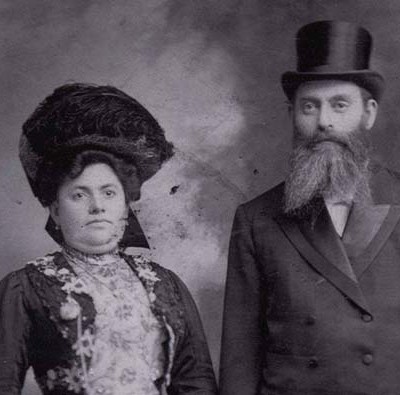
Malkie Eger left her native Russia as a young woman in the early years of the nineteenth century and settled in a Jewish community in Romania. She married, and over the next sixteen years she gave birth to thirteen children, of whom only one son and one daughter survived. Her husband died, as well. In her 40s, Eger remarried and gave birth to another son. Soon after, her second husband died, leaving Eger widowed with three children.
Her daughter, Sara Feige Eger, married Jacob Zvie Lieber, who had escaped Russia as a small child with the help of a foster family in Romania. The couple met under unusual circumstances. While visiting a local rabbi, Jacob Zvie was asked to be a witness to a divorce. The woman was Sara Feige, who was ending an arranged marriage to a much older man. Sara and Jacob Lieber settled in a nearby village and had eight children.
Their daughter Rebecca Rachel Lieber (1865-1960) married Naftoli Zvi “Harry” Eger (1849-1926). Rebecca Rachel and Harry Eger had seven children, Mollie, Max, David, Jenny, Rose, Herman and William, and they also raised the three children from Harry Eger’s first marriage, Abraham, Jacob and Dora. As anti-Semitism intensified in Romania during in the early twentieth century, members of the Eger family gradually immigrated to Jewish communities in Western Pennsylvania.
Mollie Eger (1887-1974) married a Romanian immigrant named Morris Chamovitz (1888-1974). Rose Eger (1893-1983) married a Russian immigrant named Harry Jackson (1893-1981), an Americanized version of his Russian surname Yachnovich. In 1925, Morris Chamovitz and Harry Jackson purchased the Economy Shoe Store, a bankrupt business in Aliquippa, Pa. They renamed it the Jackson Shoe Stores Inc.
Mollie and Rose worked in the store during the early days. “In the shoe store Mother’s skill blossomed,” Rose Jackson’s son Daniel Jackson later wrote. “She connected well with her women customers. They wanted shoes to make their feet look small but not that made their feet hurt. She persuaded them to buy stylish shoes in sizes a little longer but a little narrower that would be comfortable and still not look too long.” Rose Jackson took correspondence courses to learn how to fit arch supports and regularly attended shoe trade shows with her husband. She would dye shoes for women who were trying to match other pieces in their wardrobes. Under her guidance, the store became a supplier of ballet slippers for nearby dance studios.
A cousin, Joseph Eger, became a world-class French horn soloist. His 1957 album Around the Horn includes a lecture on the history of horn instruments from the shofar to the present day. Eger, a social activist, was called to testify before the House Un-American Activities Committee in 1951. He said, “Gentlemen, I play the French horn for a living. In order to play the French horn you have to hold your head up. I’d be glad to tell you anything you want to know about myself, but I can’t get friends in trouble who never did any harm. If I heard of, or hear of, somebody who is disobeying the law, I shall report them to the proper authorities. I know no such people. Thank you.”